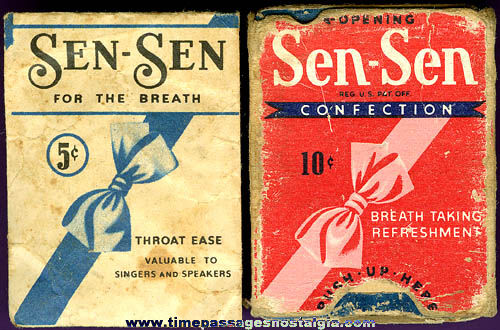Did
you know that clear back in the 1870s, shipping
companies lobbied Jules Verne to include them by name in his novel Around the World in 80 Days ? Even in the
nineteenth century, corporations saw the potential for product placement
advertising in literature.
I stumbled upon the following list on Wikipedia the other day. It’s a list of literary references for the old-fashioned breath freshener Sen-Sen, which you can still find today, I believe. I’d bet that maybe only Coca-Cola could generate a longer list than this:
I stumbled upon the following list on Wikipedia the other day. It’s a list of literary references for the old-fashioned breath freshener Sen-Sen, which you can still find today, I believe. I’d bet that maybe only Coca-Cola could generate a longer list than this:
- Michael Chabon references them in his novel The Amazing Adventures of Kavalier and Clay.
- Toni Morrison references them in her novel The Bluest Eye.
- Zora Neale Hurston references them in her novel Their Eyes Were Watching God.
- John D. Fitzgerald references them in his novel The Great Brain.
- Betty Smith references them in her novel A Tree Grows in Brooklyn.
- Robert Asprin has a character called "The Sen Sen Ante Kid" in his novel Little Myth Marker. The character plays Dragon Poker and always starts the game by adding a Sen Sen to the ante.
- Stephen King references them in his novel 11/22/63 as well as in his novella The Library Policeman.
- Philip Roth references them in his novel I Married A Communist.
- Ray Bradbury references them in his novel Death is a Lonely Business.
- Robert Penn Warren references a character named Sen-Sen Puckett "who chewed Sen-Sen to keep his breath sweet" in his novel All The King's Men.
- Phillip K. Dick references them in his novel Ubik.
- W. Somerset Maugham mentions them in his novel Of Human Bondage.
- John Steinbeck references them in the novel The Wayward Bus.
- Thomas Harris references them in the novel The Silence of the Lambs. "... she felt the ache of his whole yellow-smiling Sen-Sen lonesome life..."
- Christopher Bram references them in his 1988 novel Hold Tight.
- Chuck Palahniuk references them in his 2011 novel Damned.
- Margaret Laurence references them in her novel A Bird in the House.
- Lanford Wilson references them in his play Talley's Folly.
- They are also referenced in Tennessee Williams' A Streetcar Named Desire.
- They are referred to in the song "Ya got trouble" in the movie and play 'The Music Man'

